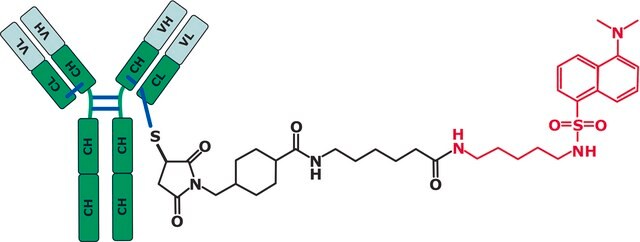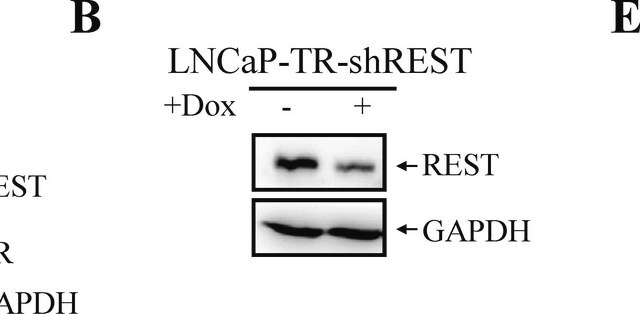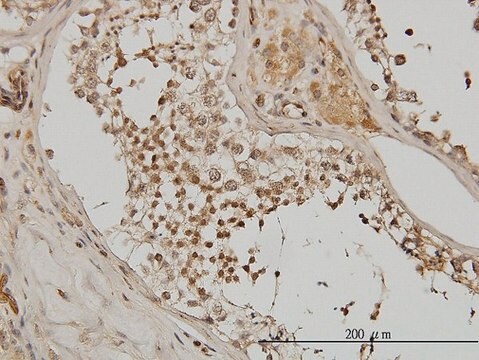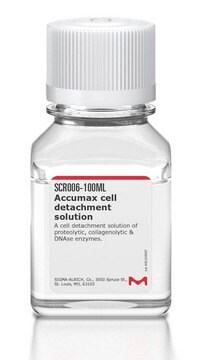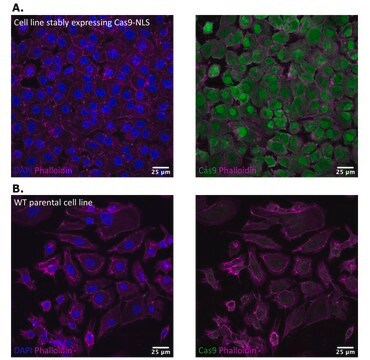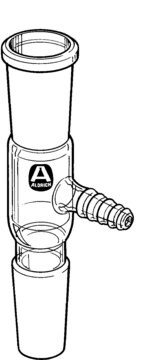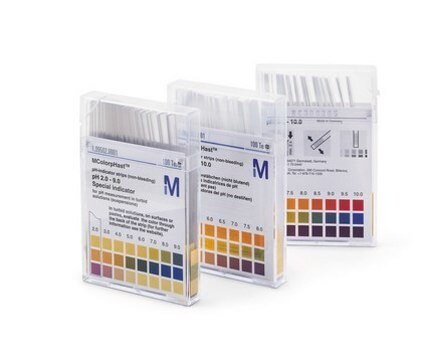MABE1982
Anti-REST Antibody, clone 12C11
About This Item
Empfohlene Produkte
Biologische Quelle
mouse
Qualitätsniveau
Antikörperform
purified antibody
Klon
12C11, monoclonal
Mol-Gew.
calculated mol wt 170 kDa
observed mol wt ~170 kDa
Aufgereinigt durch
using protein G
Speziesreaktivität
chicken, human, mouse
Verpackung
antibody small pack of 100 μg
Methode(n)
electrophoretic mobility shift assay: suitable
immunocytochemistry: suitable
immunohistochemistry (formalin-fixed, paraffin-embedded sections): suitable
immunoprecipitation (IP): suitable
western blot: suitable
Isotyp
IgG1κ
Epitopsequenz
N-terminus
UniProt-Hinterlegungsnummer
Versandbedingung
2-8°C
Posttranslationale Modifikation Target
unmodified
Angaben zum Gen
chicken ... REST(422623)
Allgemeine Beschreibung
Spezifität
Immunogen
Anwendung
Evaluated by Western Blotting in lysate from E14-Tg2a mouse embryonic stem cells.
Western Blotting Analysis (WB): A 1:1,000 dilution of this antibody detected REST in lysate from E14-Tg2a mouse embryonic stem cells.
Tested Applications
Electrophoretic Mobility Shift Assay: A representative lot detected REST in Electrophoretic Mobility Shift Assay. (Kim, S.M., et al. (2006). Biochem Biophys Res Commun. 346(2):426-35).
Immunocytochemistry Analysis: A representative lot detected REST in Immunocytochemistry applications (Shimojo, M. et al. (2008). J Biol Chem. 283(50):34880-6).
Western Blotting Analysis: A representative lot detected REST in Western Blotting applications (Chen, Z.F., et al. (1998). Nat Genet. 20(2):136-42).
Immunoprecipitation Analysis: A representative lot immunoprecipitated REST in Immunoprecipitation applications (Shimojo, M. et al. (2008). J Biol Chem. 283(50):34880-6).
Immunohistochemistry Applications: A representative lot detected REST in Immunohistochemistry applications (Paquette, A.J., et al. (2000). Proc. Natl. Acad. Sci. USA. 97(22):12318-23).
Immunocytochemistry Analysis: A 1:25 dilution from a representative lot detected REST in NTERA-2 cell line.
Note: Actual optimal working dilutions must be determined by end user as specimens, and experimental conditions may vary with the end user
Physikalische Form
Lagerung und Haltbarkeit
Sonstige Hinweise
Haftungsausschluss
Lagerklassenschlüssel
12 - Non Combustible Liquids
WGK
WGK 1
Flammpunkt (°F)
Not applicable
Flammpunkt (°C)
Not applicable
Analysenzertifikate (COA)
Suchen Sie nach Analysenzertifikate (COA), indem Sie die Lot-/Chargennummer des Produkts eingeben. Lot- und Chargennummern sind auf dem Produktetikett hinter den Wörtern ‘Lot’ oder ‘Batch’ (Lot oder Charge) zu finden.
Besitzen Sie dieses Produkt bereits?
In der Dokumentenbibliothek finden Sie die Dokumentation zu den Produkten, die Sie kürzlich erworben haben.
Unser Team von Wissenschaftlern verfügt über Erfahrung in allen Forschungsbereichen einschließlich Life Science, Materialwissenschaften, chemischer Synthese, Chromatographie, Analytik und vielen mehr..
Setzen Sie sich mit dem technischen Dienst in Verbindung.